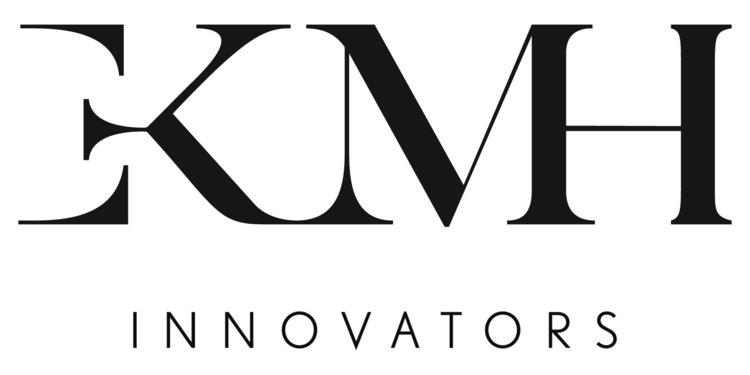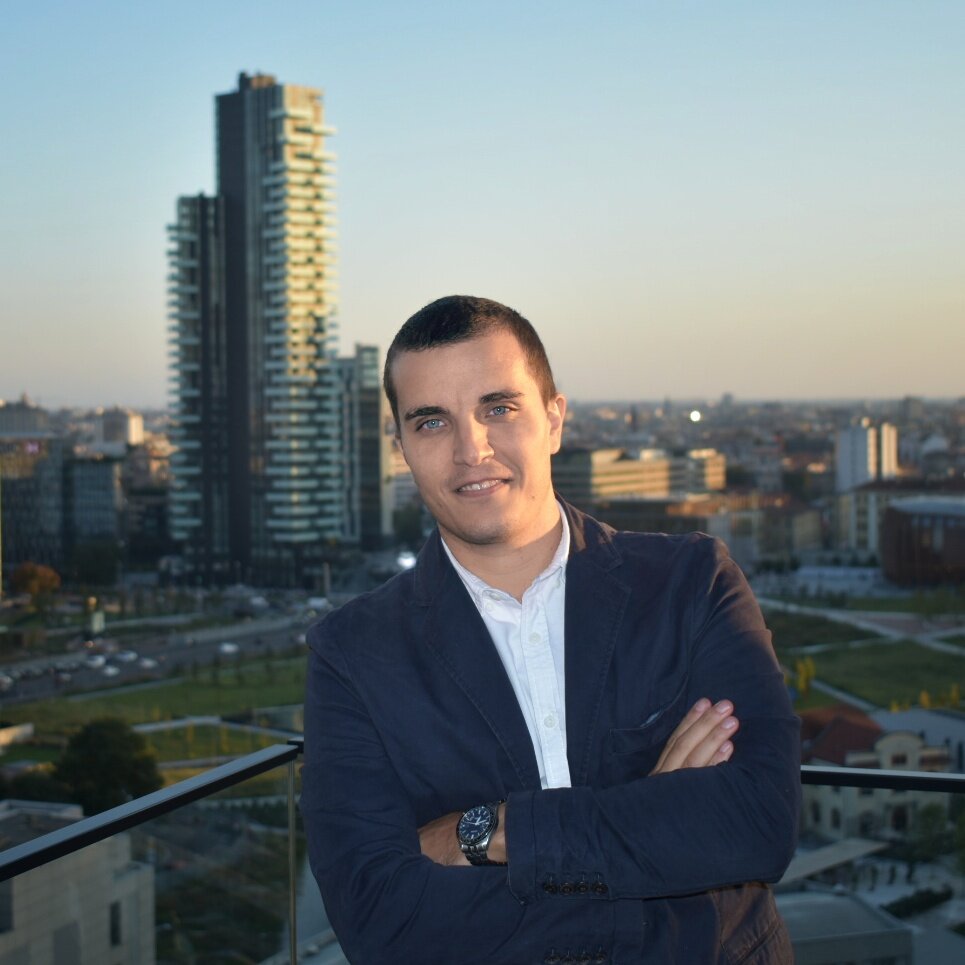EKMH Innovators Interview Series
An interview series spotlighting global tech influencers, disruptors, visionaries, and of course, innovators.
Around the world cities and towns are slowly re-opening and addressing how to emerge stronger — and with empathy — from the crises caused by coronavirus. Thank you again to those frontline workers and medical professionals around the world who have been tirelessly working non-stop, often under-appreciated and over-questioned for their dedication.
This week we focus on Barcelona-based entrepreneur and Fintastico Co-Founder & Head of Growth Fabrizio Villani. Known for his entrepreneurial expertise and energetic attitude, Villani specializes in Fintech, Insurtech, finance and sustainability. In 2018 he aligned with Fabio Marras to co-found Fintastico, a platform that curates a selection of fintech services and fintech news to address the financial needs of consumers, retailers, companies and financial institutions. Fintastico, the "TripAdvisor of innovative financial services," allows both individuals and businesses to discover a gamut of innovative financial services and ultimately help them to better manage their money and become more financially aware.
Tomorrow and Thursday Fintastico hosts the online event, “Fintech after CV-19”; readers, it’s not too late to register and participate from the comfort of your home!
I caught up with Villani via email to learn more about the virtual conference, his advice on emerging stronger after the pandemic, post-corona fintech and insurtech expectations, personal branding, the importance of community involvement -particularly as an Assofintech Board Member or Mentors4U volunteer, stoicism and more. Our interview follows.
EKMH: On 27-28 May Fintastico is hosting the online event “Fintech after CV-19.” Please share some details about the event and your own thoughts about the future of FinTech.
Fabrizio Villani: COVID has a tremendous impact on our lives and changes the way we work, consume and interact. We will discuss this and many other topics (e.g. End of Cash, 5G and fintech, Green Fintech, Crypto, Fintech Jobs, etc.) together with more than 25 amazing speakers. Here all the details.
Yesterday, today and tomorrow, for traditional finance there is only one obligatory path: digitization. Collaborations and partnerships with fintechs are the only way financial institutions have to hope to stem big technology companies.
EKMH: Spain and Italy are gradually emerging from more than a 2 months’ lockdown. What steps would recommended to fellow entrepreneurs and their teams to help them emerge stronger from the quarantine?
Fabrizio Villani: It is important to adopt measures that, although unpopular, can save your startup or your company from bankruptcy. Analyze what costs can be avoided, how much money we have, reflect and make an action plan and execute it immediately.
Some common sense rules an entrepreneur should follow are:
- Agree on temporary salary adjustments, especially those of managers or consultants who are usually the most expensive (and are the ones that have the greatest impact on the budget).
- Take advantage to optimize or make your company website multilingual, thinking about markets you haven't thought about until now.
- Use this period to train employees, make available for them a language course or courses where they can learn new skills.
EKMH: What do you anticipate the financial needs of consumers, retailers, enterprises and financial institutions will be in the next weeks, months and year? How will Fintastico help facilitate solutions?
Fabrizio Villani: Unfortunately I don’t have a crystal ball, a condition that a lot of people around the world share but not all (astrologers and some economists seem to have it). For the type of work I do within digital marketing and growth strategies, I always try to rely on data and specifically on the analysis and quality of data.
Let me give you an example, last week I decided to make a test with my LinkedIn profile. I submitted a survey to my contacts (a recent feature introduced by LinkedIn), where I asked them, if they will still need their bank branch after covid. Below are the results:
The statistical sample is obviously too small to reach any conclusions, but I am convinced that the coronavirus has allowed an acceleration of the adoption of fintech around the world. Currently there are too many offerings of fintech services on the market, while the demand is growing but not yet mature. Fintastico is a marketplace that allows consumers and businesses to discover new innovative financial services, while for fintechs we allow them to reduce their customer acquisition costs through customized digital marketing services and insights. The perfect meeting between supply and demand.
EKMH: The potential impact of FinTech startups in the world economy is mind-bogglingly enormous. How can Fintastico help fellow fintechers and insurtechers launch post-COVID-19?
Fabrizio Villani: Thanks to our positioning and traffic, we are an excellent channel for acquiring new customers for fintech and insurtech startups. We offer them a qualified audience interested in the products or services they offer. With the recent Google's third-party cookie phaseout announcement, realities like ours could grow in importance on the internet, as publishers are looking for new business models, while advertisers are looking for new distribution channels to reach their target customers.
We don’t collaborate only with players from the fintech world, but also with incumbents, but only with the ones that offer truly innovative and transparent products. Too often, it seems to me that some financial institutions seek to convey an image of innovation and transparency, while in fact they are conducting business as usual. This is what I call “finwashing”, a neologism that I derived from sustainability, from the well-known concept of "greenwashing".
Fintastico CoFounder / Head of Growth Fabrizio Villani & Jekaterina Govina.
EKMH: As a leader and innovator, when do you prefer to work solo verses work on a team? What personal qualities have enabled you to lead and collaborate well?
Fabrizio Villani: I prefer to work alone when there is a project that I can carry out on my own. Teamwork can sometimes be frustrating, especially now because working remotely it is not always possible to quickly complete projects. With regards to the personal quality that enabled me to lead and collaborate well, I would say empathy.
Working under pressure and under deadlines is never easy, but I think it is always useful to keep in mind and distinguish between the things that are under our control from those that go beyond our work (both as individuals and as a group). In this way we manage to remain calm and to clear our mind for the better.
EKMH: How have you addressed the pandemic in the Fintech, Insurtech & Cryptocurrency classes you teach as a Lecturer at EAE Business School? What advice would you give to the graduating and rising classes about how to navigate the interview process and job market?
Fabrizio Villani: Unfortunately, during the Fintech, Insurtech & Cryptocurrency classes I was unable to update the examples I proposed on the slides to the students. Obviously, in carrying out the classes (with all the limitations that a videoconference entails) I try to make students reflect on the possible developments and solutions that can currently help consumers and businesses.
When I started my career in fintech (at the end of 2013), I decided to test (a bit like I did with the LinkedIn survey above) the concept of personal branding. At the beginning I thought of personal branding as something smoky and fake. With hindsight, I must admit that it was one of the most beautiful evaluation mistakes I made in my entire life. The development and care of my own personal brand has opened up possibilities and connections that I never imagined. This is what I tell and recommend to my students. Personal branding is a strategy that is not within everyone's reach, I believe some courage is needed... only the brave.
EKMH: You have a record of giving back to the community, whether as an Assofintech Board Member or as a Mentors4U volunteer. How would you encourage more business leaders to become involved in their communities?
Fabrizio Villani: Giving back to the community or even doing charity work are not spontaneous behaviors. I believe these behaviors depend a lot on the experience and personal history of each of us. In the case of Mentors4U, I’m supporting a young boy in his path of growth both academically and professionally. My hope is that in turn, once he has become an established professional, he will also decide to do the same thing with someone else. Cradle to Cradle but with humans.
EKMH: Lastly, which books and podcasts top your recommended list?
Fabrizio Villani: Lately I have discovered stoicism, a philosophy by which I am deeply fascinated. My suggestions are therefore highly influenced by this discovery.
As for the book, Meditations by Marcus Aurelius. Simply amazing. Marcus Aurelius was the philosopher-emperor, his teachings go far beyond his victories on the battlefield and the passage of time.
As for the podcast, Daily Stoic Podcast by Ryan Holiday. Ryan Holiday started his career as a growth hacker and after several professional successes where he also became the Director of Marketing for American Apparel, he left the company and began his path towards stoicism, becoming a famous writer on the topic.
*Disclaimer: The views and opinions expressed in this series are those of the interviewees and do not necessarily reflect the views or positions of any entities they represent.
Search below and read more interviews in the Innovators Interview Archive or via MuckRack. Don’t miss an interview or prediction! Be a part of the conversation.



